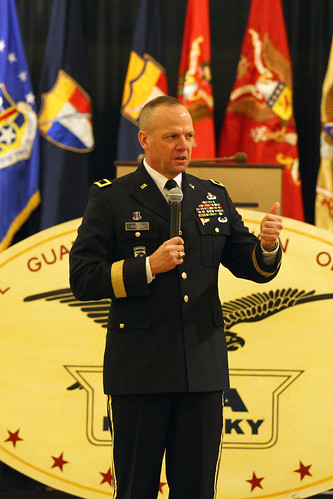By Staff Sgt. Scott Raymond, Kentucky National Guard Public Affairs
[caption id="" align="alignright" width="350"]

Brig. Gen. Stephen R. Hogan was appointed the 52nd adjutant general of Kentucky, Dec. 7, 2015 by newly-elected Gov. Matt Bevin. (Kentucky National Guard photo)
FRANKFORT, Ky. -- A favorite quote amongst members of the Kentucky Guard goes like this, "There's something in the very air of Kentucky which makes a man a Soldier."
That's also how you could sum up Brig. Gen. Stephen R. Hogan, Kentucky's newest Adjutant General
.
After a 30-year career in an Army uniform, Hogan returned from retirement in December to assume the role as the commonwealth's 52nd adjutant general.
Hogan inherits a Kentucky National Guard that is in his mind "the best it's ever been."
It's now his job to keep it there.
"Everyday in uniform is a blessing. Being a Soldier is all I've wanted to do since I was five-years-old, and this position offers me a challenge I have not seen before," he said. "I derive satisfaction from being around the Soldier and being a part of this team. The willingness to serve something bigger than self is the cost of admission for this organization."
After three decades in service, Hogan will rely on his Soldier's perspective to lead Kentucky's Soldiers and Airmen. That strong frame of reference for operations across the spectrum must serve him well as the Guard continues to be called upon at a moment's notice in a variety of ways.
"We've become comfortable with unpredictability in an ambiguous environment," he said. “ the Guard needs to remind itself of its role, and the reoccurring themes of flexibility and expertise in a great deal of areas.”
"I think any unit needs to be orchestrated, as a team and there is no point in a Guardsman's career from E-2 to a two-star that the standards aren't important."
On his first day in the Guard in 1993, Hogan received what he calls the keys to leadership at the most simplistic, basic level.
"Retired Col. Bill Clark summed it up like this; 'You must be a subject matter expert in your field, and whatever your troops are required to do, you are required to do.'"
Hogan said he hasn't forgotten those words and that ideal. He said they've helped carry him through his career as an officer. Military education and experience have taught him more, but not as much as that original to-the-point conversation.
Hogan's father was the only direct family member that served in the military. Even though he was drafted into the Army in the 1950s, Hogan said his father was very proud of his service because he understood the concept of service of self.
After commissioning through Morehead State University's ROTC program in 1985, Hogan served eight years on active duty with the 101st Airborne Division and 6th Infantry Division.
[caption id="" align="alignleft" width="266"]

Brig. Gen. Stephen R. Hogan speaks during the National Guard Association of Kentucky conference in Louisville, Ky., Feb. 6, 2016. Hogan said the Kentucky Guard was in as good of shape as it could be and stressed teamwork for the organization moving forward. (U.S. Army National Guard photo by Staff Sgt. Scott Raymond)
June 2, 1993 was Hogan's first day as a Kentucky Guardsmen. He became a tactical officer with the 138th Field Artillery Brigade, followed by stints with the 149th Armor and Kentucky's Officer Candidate School.
But it would be his time in command of Kentucky's Joint Support Operations, the Counter Drug task force that would define the leader that now commands the Kentucky Guard.
As the former commander of the hand-picked unit, Hogan said he has seen some of the finest Soldiers Kentucky has to offer serving the commonwealth. He said leading a group of driven Soldiers with such camaraderie and dedication to service remains a highlight of his career. It was core principles that he believes made and continues to make JSO such a quality unit. An idea he sees as essential for the Guard to thrive.
"We're going to emphasize core fundamentals and competencies for Soldiers and Airmen. We've proven what we can do and how well we've done it, but I would like to see some forward movement in all aspects of how we do our jobs."
"I would like to see the organization return to those core competencies and become an even more professional institution."
Hogan understands he now has a unit of 8,500 under him to supervise and represent. It's time for him to become a subject matter expert in a new job, for which he knows he has work to do. And his success will be measured on the success of his troops.
"If I don't push myself, the organization pushes me, and requires me to be the best version of myself as we go forward in order to earn my part on the team."